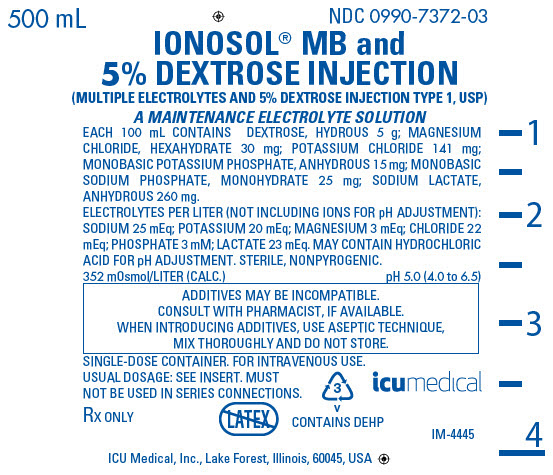Ionosol Mb And Dextrose while Breastfeeding

What is Ionosol Mb And Dextrose used for?
Is Ionosol Mb And Dextrose usage safe while breastfeeding? If a lactating mother is using it can there be any effect on growth or development of infant?
Ionosol Mb And Dextrose Breastfeeding Analsys
Dextrose monohydrate while Breastfeeding
SafeCAS Number: 50-99-7
Glucose (dextrose), as a component of oral re-hydration solutions, fluids for IV use, or, as excipient of drugs, is entirely compatible with breastfeeding. Nevertheless, D/W solutions orally used in neonates just after birth are highly discourage since it may affect initiation of lactation seriously.
Sodium lactate while Breastfeeding
SafeCAS Number: 72-17-3
It is a constituent of IV and dialysis fluids. No problem with BF has been reported.
Potassium chloride while Breastfeeding
SafeCAS Number: 7447-40-7
Human milk has a potassium concentration of 13 meq/L, almost a half of rehydration solution content and a quarter of maximal IV recommended dose. Potassium supplementation does not alter milk concentration without increasing mother’s serum concentration, which is strictly limited from 3,5 to 5,5 meq/L.
Monobasic potassium phosphate while Breastfeeding
SafeCAS Number: 7447-40-7
Human milk has a potassium concentration of 13 meq/L, almost a half of rehydration solution content and a quarter of maximal IV recommended dose. Potassium supplementation does not alter milk concentration without increasing mother’s serum concentration, which is strictly limited from 3,5 to 5,5 meq/L.
Ionosol Mb And Dextrose Breastfeeding Analsys - 2
Magnesium chloride while Breastfeeding
CAS Number: 3344-18-1

No information is available on the clinical use of magnesium citrate during breastfeeding. However, other magnesium salts have been studied. Intravenous magnesium sulfate increases milk magnesium concentrations only slightly. Oral absorption of magnesium by the infant is poor, so maternal magnesium citrate is not expected to affect the breastfed infant's serum magnesium. Magnesium citrate supplementation during pregnancy might delay the onset of lactation, but it can be taken during breastfeeding and no special precautions are required.
Sodium phosphate, monobasic, monohydrate while Breastfeeding
CAS Number: 7558-79-4; 7558-80-7
Phosphate is a normal constituent of breastmilk. Phosphate concentrations have not been measured in breastmilk after large maternal doses of sodium phosphate, such a 30 gram oral dose for pre-procedural bowel evacuation. However, the added phosphate in breastmilk is likely to be only about 130 mg over 24 hours in this situation. The increase from a typical dose of a rectal enema would be considerably less than this amount. Breastmilk sodium concentration is tightly regulated, and will not be affected. It is probably not necessary to suspend breastfeeding after the use of oral sodium phosphate solutions given once or twice for bowel evacuation before a procedure, but if there is concern, suspension of nursing for 24 hours after a dose should result in negligible increase in phosphate ingestion by the infant. Use of a phosphate rectal enema by a nursing mother would require no special precautions.
Ionosol Mb And Dextrose Breastfeeding Analsys - 3
Sodium phosphate, monobasic, monohydrate and Breastfeeding
SafeI am nursing mother and I have already used Ionosol Mb And Dextrose, what should I do?
We are not completely sure about safety of Ionosol Mb And Dextrose in breastfeeding. We would suggest you to contact your doctor or health care provider and explain your situation with Ionosol Mb And Dextrose. If you observe anything abnormal with your baby please call 911 or contact emergency services in your area.
I am nursing mother and my doctor has suggested me to use Ionosol Mb And Dextrose, is it safe?
If your doctor considers Ionosol Mb And Dextrose safe enough to prescribe for you that means its benefits outweigh its known risks.
If I am using Ionosol Mb And Dextrose, will my baby need extra monitoring?
Not Sure, Please check with your doctor or lactation consultant.
Who can I talk to if I have questions about usage of Ionosol Mb And Dextrose in breastfeeding?
US
National Womens Health and Breastfeeding Helpline: 800-994-9662 (TDD 888-220-5446) 9 a.m. and 6 p.m. ET, Monday through Friday
UK
National Breastfeeding Helpline: 0300-100-0212 9.30am to 9.30pm, daily
Association of Breastfeeding Mothers: 0300-330-5453
La Leche League: 0345-120-2918
The Breastfeeding Network supporter line in Bengali and Sylheti: 0300-456-2421
National Childbirth Trust (NCT): 0300-330-0700
Australia
National Breastfeeding Helpline: 1800-686-268 24 hours a day, 7 days a week
Canada
Telehealth Ontario for breastfeeding: 1-866-797-0000 24 hours a day, 7 days a week
